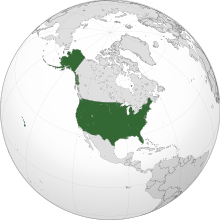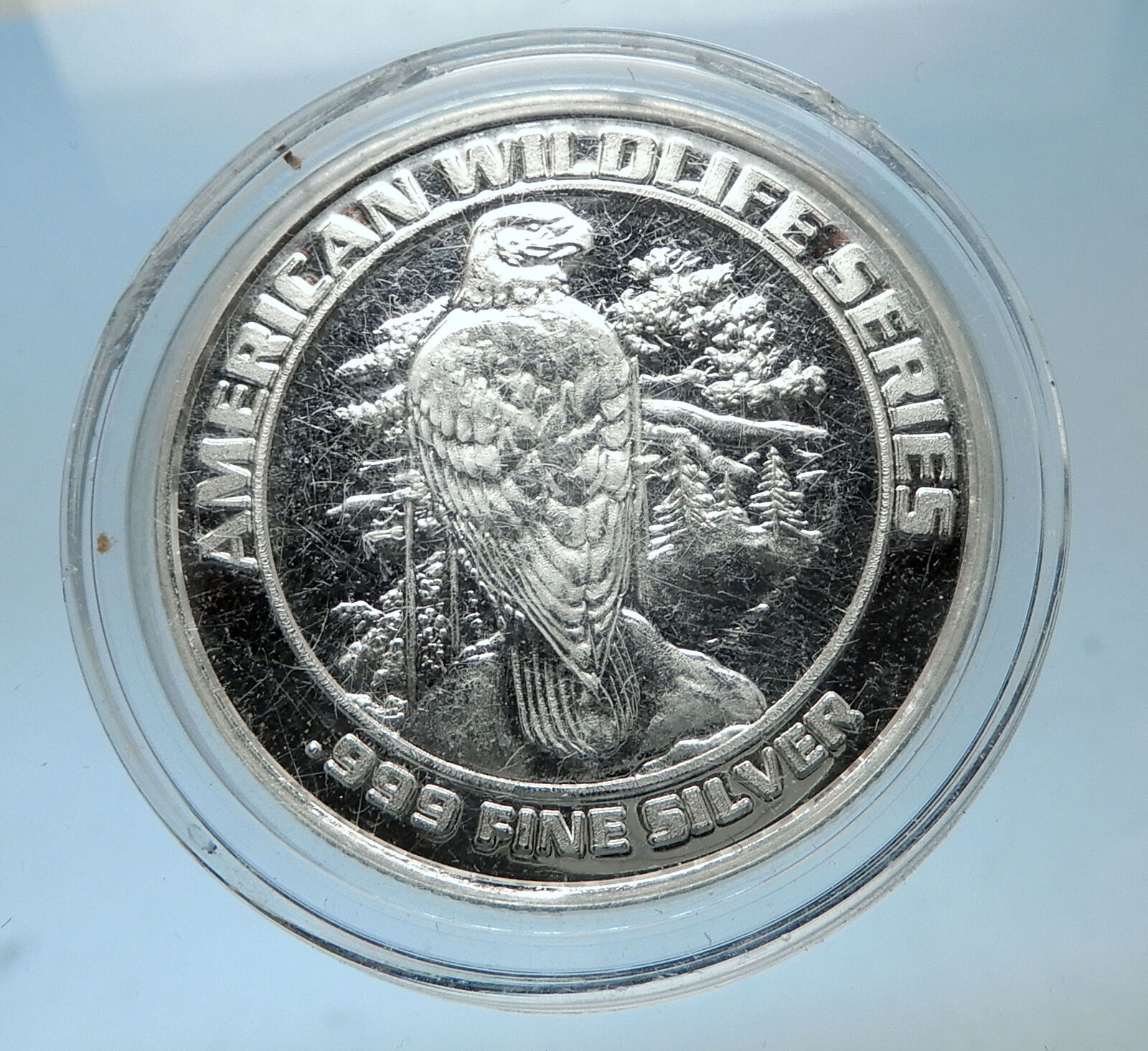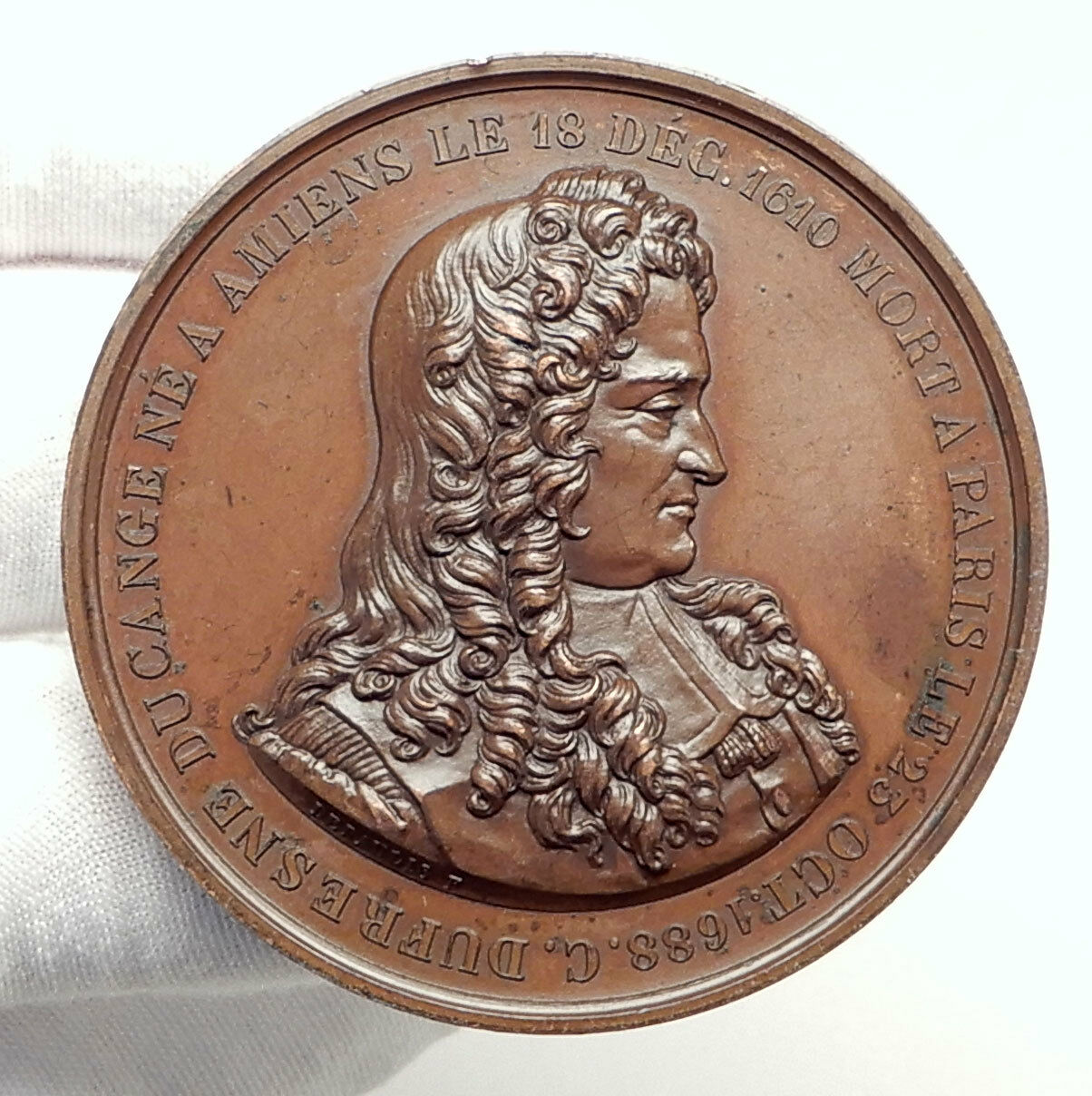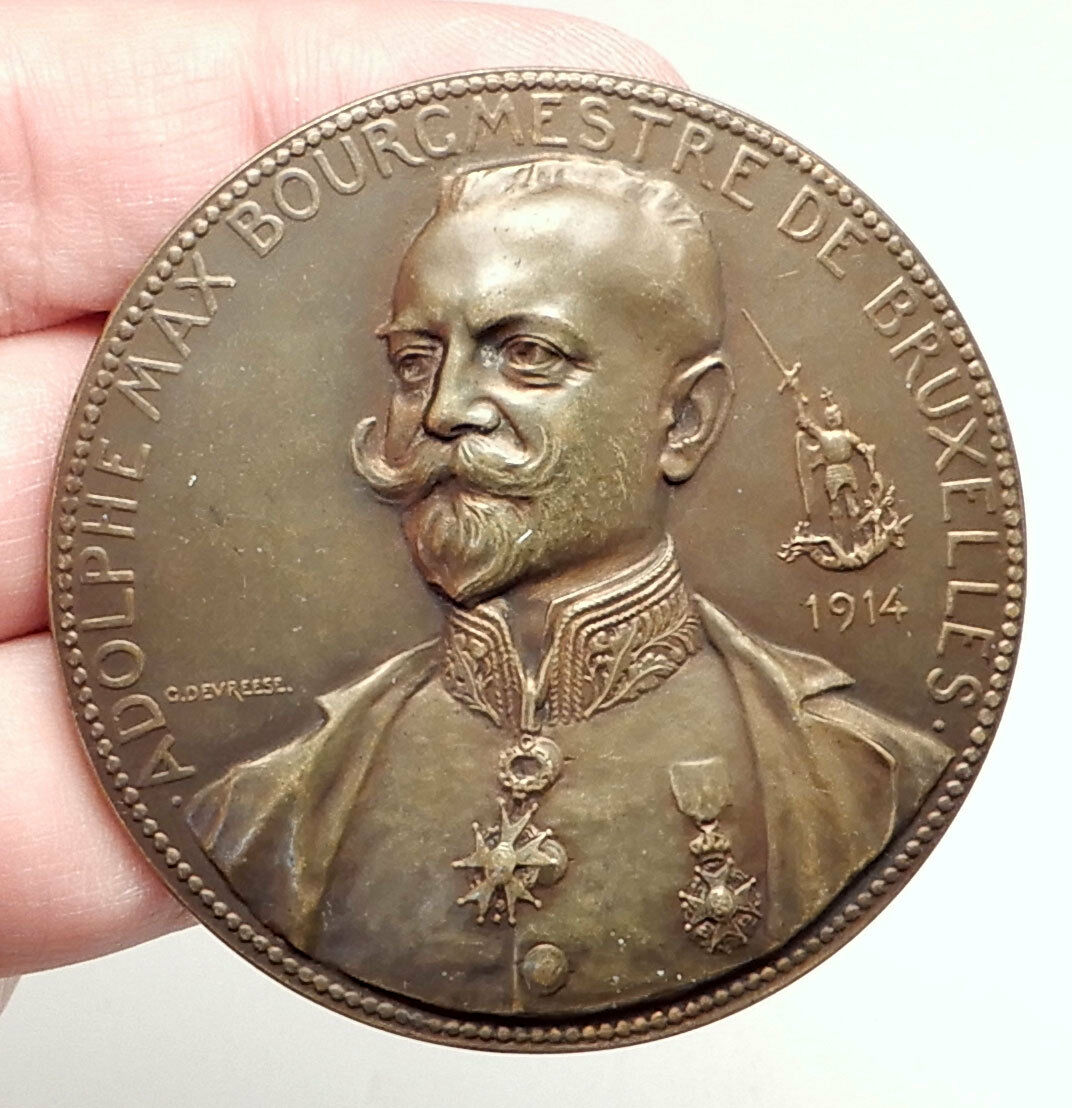|
United States of America
Franklin Mint ANCS Series – Booker T. Washington
1971 Proof Silver Medal 39mm (27.25 grams) Sterling Silver
Reference: Franklin Mint 0581 | Sculptor: Albino Manca
BOOKER T. WASHINGTON 1856 1915, Booker facing, flames of knowledge on either side.
* WHERE THERE IS NO VISION * THE PEOPLE PERISH PROV. 29:18, Construction workers atop, men plowing fields below.
Edge Lettering:
STERLING 71 P 0851
You are bidding on the exact item pictured, provided with a Certificate of Authenticity and Lifetime Guarantee of Authenticity.
 Booker Taliaferro Washington (April 5, 1856 – November 14, 1915) was an American educator, author, orator, and adviser to several presidents of the United States. Between 1890 and 1915, Washington was the dominant leader in the African-American community and of the contemporary black elite. Washington was from the last generation of black American leaders born into slavery and became the leading voice of the former slaves and their descendants. They were newly oppressed in the South by disenfranchisement and the Jim Crow discriminatory laws enacted in the post-Reconstruction Southern states in the late 19th and early 20th centuries. Booker Taliaferro Washington (April 5, 1856 – November 14, 1915) was an American educator, author, orator, and adviser to several presidents of the United States. Between 1890 and 1915, Washington was the dominant leader in the African-American community and of the contemporary black elite. Washington was from the last generation of black American leaders born into slavery and became the leading voice of the former slaves and their descendants. They were newly oppressed in the South by disenfranchisement and the Jim Crow discriminatory laws enacted in the post-Reconstruction Southern states in the late 19th and early 20th centuries.
Washington was a key proponent of African-American businesses and one of the founders of the National Negro Business League. His base was the Tuskegee Institute, a normal school, later a historically black college in Tuskegee, Alabama at which he served as principal. As lynchings in the South reached a peak in 1895, Washington gave a speech, known as the “Atlanta compromise”, which brought him national fame. He called for black progress through education and entrepreneurship, rather than trying to challenge directly the Jim Crow segregation and the disenfranchisement of black voters in the South.
Washington mobilized a nationwide coalition of middle-class blacks, church leaders, and white philanthropists and politicians, with a long-term goal of building the community’s economic strength and pride by a focus on self-help and schooling. With his own contributions to the Black community, Washington was a supporter of racial uplift, but secretly he also supported court challenges to segregation and to restrictions on voter registration.
Washington had the ear of the powerful in the America of his day, including presidents. His mastery of the American political system in the later 19th century allowed him to manipulate the media, raise money, develop strategy, network, distribute funds, and reward a cadre of supporters. Nevertheless, opposition to Washington grew, as it became clear that his Atlanta compromise did not produce the promised improvement for most Blacks in the South. William Monroe Trotter and W. E. B. Du Bois, whom Bookerites perceived in an antebellum way as “northern Blacks”, found Washington too accommodationist and his industrial (“agricultural and mechanical”) education inadequate. Washington fought vigorously against them and succeeded in his opposition to the Niagara Movement they tried to found but could not prevent their formation of the NAACP, whose views became mainstream.
Black activists in the North, led by Du Bois, at first supported the Atlanta compromise, but later disagreed and opted to set up the National Association for the Advancement of Colored People (NAACP) to work for political change. They tried with limited success to challenge Washington’s political machine for leadership in the Black community, but built wider networks among white allies in the North. Decades after Washington’s death in 1915, the civil rights movement of the 1950s took a more active and progressive approach, which was also based on new grassroots organizations based in the South, such as Congress of Racial Equality (CORE), the Student Nonviolent Coordinating Committee (SNCC) and Southern Christian Leadership Conference (SCLC).
Washington’s legacy has been controversial in the civil rights community. After his death in 1915, he came under heavy criticism for accommodationism to white supremacy, despite his claims that his long-term goal was to end the disenfranchisement of African Americans, the vast majority of whom still lived in the South. However, a more neutral view has appeared since the late 20th century. As of 2010, most recent studies “defend and celebrate his accomplishments, legacy, and leadership”.
 The United States of America (USA), commonly known as the United States (U.S. or US) or America, is a country composed of 50 states, a federal district, five major self-governing territories, and various possessions. At 3.8 million square miles (9.8 million km2), the United States is the world’s third or fourth largest country by total area and is slightly smaller than the entire continent of Europe’s 3.9 million square miles (10.1 million km2). With a population of over 327 million people, the U.S. is the third most populous country. The capital is Washington, D.C., and the largest city by population is New York City. Forty-eight states and the capital’s federal district are contiguous in North America between Canada and Mexico. The State of Alaska is in the northwest corner of North America, bordered by Canada to the east and across the Bering Strait from Russia to the west. The State of Hawaii is an archipelago in the mid-Pacific Ocean. The U.S. territories are scattered about the Pacific Ocean and the Caribbean Sea, stretching across nine official time zones. The extremely diverse geography, climate, and wildlife of the United States make it one of the world’s 17 megadiverse countries. The United States of America (USA), commonly known as the United States (U.S. or US) or America, is a country composed of 50 states, a federal district, five major self-governing territories, and various possessions. At 3.8 million square miles (9.8 million km2), the United States is the world’s third or fourth largest country by total area and is slightly smaller than the entire continent of Europe’s 3.9 million square miles (10.1 million km2). With a population of over 327 million people, the U.S. is the third most populous country. The capital is Washington, D.C., and the largest city by population is New York City. Forty-eight states and the capital’s federal district are contiguous in North America between Canada and Mexico. The State of Alaska is in the northwest corner of North America, bordered by Canada to the east and across the Bering Strait from Russia to the west. The State of Hawaii is an archipelago in the mid-Pacific Ocean. The U.S. territories are scattered about the Pacific Ocean and the Caribbean Sea, stretching across nine official time zones. The extremely diverse geography, climate, and wildlife of the United States make it one of the world’s 17 megadiverse countries.
.svg/85px-Great_Seal_of_the_United_States_(obverse).svg.png) Paleo-Indians migrated from Siberia to the North American mainland at least 12,000 years ago. European colonization began in the 16th century. The United States emerged from the thirteen British colonies established along the East Coast. Numerous disputes between Great Britain and the colonies following the French and Indian War led to the American Revolution, which began in 1775, and the subsequent Declaration of Independence in 1776. The war ended in 1783 with the United States becoming the first country to gain independence from a European power. The current constitution was adopted in 1788, with the first ten amendments, collectively named the Bill of Rights, being ratified in 1791 to guarantee many fundamental civil liberties. The United States embarked on a vigorous expansion across North America throughout the 19th century, acquiring new territories, displacing Native American tribes, and gradually admitting new states until it spanned the continent by 1848. Paleo-Indians migrated from Siberia to the North American mainland at least 12,000 years ago. European colonization began in the 16th century. The United States emerged from the thirteen British colonies established along the East Coast. Numerous disputes between Great Britain and the colonies following the French and Indian War led to the American Revolution, which began in 1775, and the subsequent Declaration of Independence in 1776. The war ended in 1783 with the United States becoming the first country to gain independence from a European power. The current constitution was adopted in 1788, with the first ten amendments, collectively named the Bill of Rights, being ratified in 1791 to guarantee many fundamental civil liberties. The United States embarked on a vigorous expansion across North America throughout the 19th century, acquiring new territories, displacing Native American tribes, and gradually admitting new states until it spanned the continent by 1848.
 During the second half of the 19th century, the Civil War led to the abolition of slavery. By the end of the century, the United States had extended into the Pacific Ocean, and its economy, driven in large part by the Industrial Revolution, began to soar. The Spanish-American War and World War I confirmed the country’s status as a global military power. The United States emerged from World War II as a global superpower, the first country to develop nuclear weapons, the only country to use them in warfare, and a permanent member of the United Nations Security Council. The Rights Acts of 1964, 1965 and 1968 outlaws discrimination based on race or color. During the Cold War, the United States and the Soviet Union competed in the Space Race, culminating with the 1969 U.S. Moon landing. The end of the Cold War and the collapse of the Soviet Union in 1991 left the United States as the world’s sole superpower. During the second half of the 19th century, the Civil War led to the abolition of slavery. By the end of the century, the United States had extended into the Pacific Ocean, and its economy, driven in large part by the Industrial Revolution, began to soar. The Spanish-American War and World War I confirmed the country’s status as a global military power. The United States emerged from World War II as a global superpower, the first country to develop nuclear weapons, the only country to use them in warfare, and a permanent member of the United Nations Security Council. The Rights Acts of 1964, 1965 and 1968 outlaws discrimination based on race or color. During the Cold War, the United States and the Soviet Union competed in the Space Race, culminating with the 1969 U.S. Moon landing. The end of the Cold War and the collapse of the Soviet Union in 1991 left the United States as the world’s sole superpower.
The United States is the world’s oldest surviving federation. It is a federal republic and a representative democracy. The United States is a founding member of the United Nations, World Bank, International Monetary Fund, Organization of American States (OAS), and other international organizations. The United States is a highly developed country, with the world’s largest economy by nominal GDP and second-largest economy by PPP, accounting for approximately a quarter of global GDP. The U.S. economy is largely post-industrial, characterized by the dominance of services and knowledge-based activities, although the manufacturing sector remains the second-largest in the world. The United States is the world’s largest importer and the second largest exporter of goods, by value. Although its population is only 4.3% of the world total, the U.S. holds 31% of the total wealth in the world, the largest share of global wealth concentrated in a single country.
Despite wide income and wealth disparities, the United States continues to rank very high in measures of socioeconomic performance, including average wage, human development, per capita GDP, and worker productivity. The United States is the foremost military power in the world, making up a third of global military spending, and is a leading political, cultural, and scientific force internationally.
|







 Booker Taliaferro Washington (April 5, 1856 – November 14, 1915) was an American educator, author, orator, and adviser to several presidents of the United States. Between 1890 and 1915, Washington was the dominant leader in the African-American community and of the contemporary black elite. Washington was from the last generation of black American leaders born into slavery and became the leading voice of the former slaves and their descendants. They were newly oppressed in the South by disenfranchisement and the Jim Crow discriminatory laws enacted in the post-Reconstruction Southern states in the late 19th and early 20th centuries.
Booker Taliaferro Washington (April 5, 1856 – November 14, 1915) was an American educator, author, orator, and adviser to several presidents of the United States. Between 1890 and 1915, Washington was the dominant leader in the African-American community and of the contemporary black elite. Washington was from the last generation of black American leaders born into slavery and became the leading voice of the former slaves and their descendants. They were newly oppressed in the South by disenfranchisement and the Jim Crow discriminatory laws enacted in the post-Reconstruction Southern states in the late 19th and early 20th centuries. The United States of America (USA), commonly known as the United States (U.S. or US) or America, is a country composed of 50 states, a federal district, five major self-governing territories, and various possessions. At 3.8 million square miles (9.8 million km2), the United States is the world’s third or fourth largest country by total area and is slightly smaller than the entire continent of Europe’s 3.9 million square miles (10.1 million km2). With a population of over 327 million people, the U.S. is the third most populous country. The capital is Washington, D.C., and the largest city by population is New York City. Forty-eight states and the capital’s federal district are contiguous in North America between Canada and Mexico. The State of Alaska is in the northwest corner of North America, bordered by Canada to the east and across the Bering Strait from Russia to the west. The State of Hawaii is an archipelago in the mid-Pacific Ocean. The U.S. territories are scattered about the Pacific Ocean and the Caribbean Sea, stretching across nine official time zones. The extremely diverse geography, climate, and wildlife of the United States make it one of the world’s 17 megadiverse countries.
The United States of America (USA), commonly known as the United States (U.S. or US) or America, is a country composed of 50 states, a federal district, five major self-governing territories, and various possessions. At 3.8 million square miles (9.8 million km2), the United States is the world’s third or fourth largest country by total area and is slightly smaller than the entire continent of Europe’s 3.9 million square miles (10.1 million km2). With a population of over 327 million people, the U.S. is the third most populous country. The capital is Washington, D.C., and the largest city by population is New York City. Forty-eight states and the capital’s federal district are contiguous in North America between Canada and Mexico. The State of Alaska is in the northwest corner of North America, bordered by Canada to the east and across the Bering Strait from Russia to the west. The State of Hawaii is an archipelago in the mid-Pacific Ocean. The U.S. territories are scattered about the Pacific Ocean and the Caribbean Sea, stretching across nine official time zones. The extremely diverse geography, climate, and wildlife of the United States make it one of the world’s 17 megadiverse countries. .svg/85px-Great_Seal_of_the_United_States_(obverse).svg.png) Paleo-Indians migrated from Siberia to the North American mainland at least 12,000 years ago. European colonization began in the 16th century. The United States emerged from the thirteen British colonies established along the East Coast. Numerous disputes between Great Britain and the colonies following the French and Indian War led to the American Revolution, which began in 1775, and the subsequent Declaration of Independence in 1776. The war ended in 1783 with the United States becoming the first country to gain independence from a European power. The current constitution was adopted in 1788, with the first ten amendments, collectively named the Bill of Rights, being ratified in 1791 to guarantee many fundamental civil liberties. The United States embarked on a vigorous expansion across North America throughout the 19th century, acquiring new territories, displacing Native American tribes, and gradually admitting new states until it spanned the continent by 1848.
Paleo-Indians migrated from Siberia to the North American mainland at least 12,000 years ago. European colonization began in the 16th century. The United States emerged from the thirteen British colonies established along the East Coast. Numerous disputes between Great Britain and the colonies following the French and Indian War led to the American Revolution, which began in 1775, and the subsequent Declaration of Independence in 1776. The war ended in 1783 with the United States becoming the first country to gain independence from a European power. The current constitution was adopted in 1788, with the first ten amendments, collectively named the Bill of Rights, being ratified in 1791 to guarantee many fundamental civil liberties. The United States embarked on a vigorous expansion across North America throughout the 19th century, acquiring new territories, displacing Native American tribes, and gradually admitting new states until it spanned the continent by 1848.  During the second half of the 19th century, the Civil War led to the abolition of slavery. By the end of the century, the United States had extended into the Pacific Ocean, and its economy, driven in large part by the Industrial Revolution, began to soar. The Spanish-American War and World War I confirmed the country’s status as a global military power. The United States emerged from World War II as a global superpower, the first country to develop nuclear weapons, the only country to use them in warfare, and a permanent member of the United Nations Security Council. The Rights Acts of 1964, 1965 and 1968 outlaws discrimination based on race or color. During the Cold War, the United States and the Soviet Union competed in the Space Race, culminating with the 1969 U.S. Moon landing. The end of the Cold War and the collapse of the Soviet Union in 1991 left the United States as the world’s sole superpower.
During the second half of the 19th century, the Civil War led to the abolition of slavery. By the end of the century, the United States had extended into the Pacific Ocean, and its economy, driven in large part by the Industrial Revolution, began to soar. The Spanish-American War and World War I confirmed the country’s status as a global military power. The United States emerged from World War II as a global superpower, the first country to develop nuclear weapons, the only country to use them in warfare, and a permanent member of the United Nations Security Council. The Rights Acts of 1964, 1965 and 1968 outlaws discrimination based on race or color. During the Cold War, the United States and the Soviet Union competed in the Space Race, culminating with the 1969 U.S. Moon landing. The end of the Cold War and the collapse of the Soviet Union in 1991 left the United States as the world’s sole superpower. 




